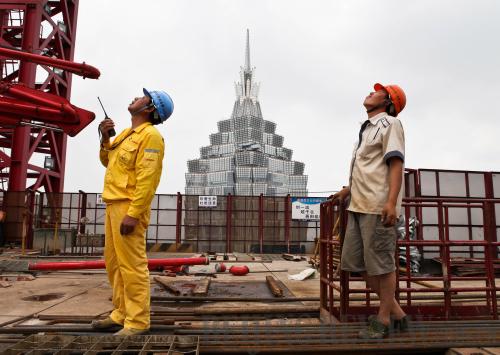|
 |
|
CONSTRUCTION BOOM: Workers stand on the 69th floor of the unfinished Shanghai Tower—the tallest building in Shanghai—on July 15, 2012 (NIU YIXIN) |

The mainstream Western media have been a source of extensive hype and speculation recently, suggesting this year will be a turning point of historic significance for developed countries ever since the World Bank predicted the economic aggregate of the developed world would drop below 50 percent of the world total in 2013.
Nevertheless, the unsustainable hegemony of the West doesn't necessarily hint that the crucial turning point will come in the near future. Of course, the rise of emerging economies in the past decade is clearly seen. Meanwhile, in the developing world, numerous sharp contradictions keep popping up in social and economic aspects; the developed world is straining every nerve to cause internal disorder in developing countries, trying to reverse what they view as an unfavorable situation.
The rise of emerging markets has been the most inspiring change in the international economic and political system since the dawn of the new century. After "the lost 10 years" or even "the lost 20 years" since the 1980s, robust economic expansion began to spread from East Asia to South Asia, Latin America and Africa, pushing them to outstrip the Western world in terms of GDP growth. Moreover, during the subprime mortgage crisis, instead of growth momentum being disrupted, emerging economies first experienced a longer period of growth with milder symptoms of a recession than developed economies since the 1980s debt crisis.
In 2011, emerging economies' GDP shot up to 48.9 percent of the world total. Among them, China contributed 14.3 percent, equaling the entire eurozone. Prior to that, China expanded on its status as the world's largest exporter. In 2010 it replaced the United States as the world's largest manufacturing country.
With growing comprehensive national strength, emerging economies have strived for a louder voice in planning and implementing international economic rules. This can be seen from their joint exclusion of an array of topics backed by Western countries on the Doha round of world trade negotiations, to elevating quota and voting shares in major international financial organizations like the World Bank and the International Monetary Fund.
Vulnerable growth
However, in the past decade, most emerging economies have been heavily dependent on the primary commodities sector for economic expansion, and the "super circle" of primary commodities has spurred economic surges since 2002. Compared with economic growth driven by the manufacturing industry, rapid expansion of the primary commodities sector includes some insurmountable weaknesses: strong economic fluctuations, aggravating income inequality, asset bubbles and exacerbating social tensions.
Meanwhile, globalization acts as a double-edged sword in the economic development of these countries and regions. On one hand, globalization allows resource-abundant emerging countries to fully tap into the commodity boom. With less trade barriers, a wider market is accessible. Free capital flow makes it possible for these countries to attract more investment than ever. On the other hand, globalization is also the culprit that strangled their manufacturing industry in an early stage, or subjected these economies to deindustrialization. There is no exception to Russia, a country heavily hit by the collapse of the Soviet Union, and Brazil, which has never suffered great upheavals like national disintegration.
|
